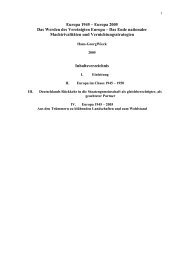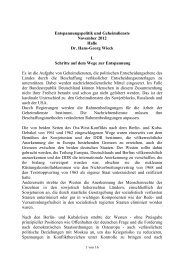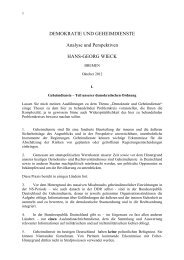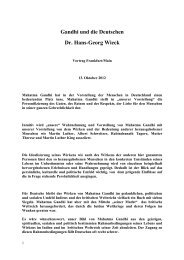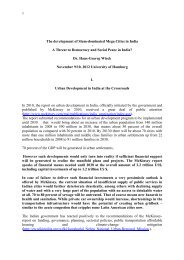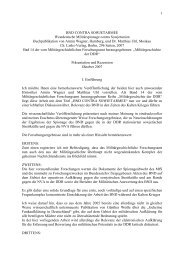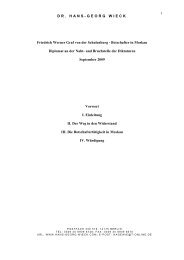Intelligence and foreign policy (pdf) - Hans-Georg Wieck
Intelligence and foreign policy (pdf) - Hans-Georg Wieck
Intelligence and foreign policy (pdf) - Hans-Georg Wieck
Create successful ePaper yourself
Turn your PDF publications into a flip-book with our unique Google optimized e-Paper software.
1<br />
<strong>Intelligence</strong> <strong>and</strong> Foreign Policy<br />
<strong>Hans</strong>-<strong>Georg</strong> <strong>Wieck</strong><br />
2003<br />
I. Introduction<br />
Decisions of the Government involving their political <strong>and</strong> military commitment with regard to<br />
national or international issues such as<br />
• threats to the internal or external security,<br />
• the maintenance of peace <strong>and</strong><br />
• challenges by non-state based international organizations that means by terrorists<br />
organizations to the peaceful international cooperation of states <strong>and</strong> nations <strong>and</strong> to peace<br />
<strong>and</strong> security within national boundaries<br />
put at risk the credibility of the Government in the eyes of the citizens, the international<br />
prestige of the Government <strong>and</strong> the responsibility of the Government for the life of its<br />
soldiers.<br />
The engagement of German military units in Afghanistan has to be re-evaluated in regular<br />
intervals. At the latest, on the occasion of the commitment of German forces in support of the<br />
fragile process towards peace, democracy <strong>and</strong> the respect for Human Rights on the Balkans<br />
some years ago - the political elite in Germany ab<strong>and</strong>oned its prejudicial attitudes <strong>and</strong><br />
distance towards the intelligence organisations of the Federal Republic - more by way of<br />
necessity than by choice. This change of attitude constitutes an important step towards<br />
normality <strong>and</strong> a business like approach of the Government of the Federal Republic of<br />
Germany towards its intelligence organisations <strong>and</strong> towards the establishment of a genuine<br />
freedom of action on the national <strong>and</strong> the national stage very much needed in order to meet<br />
the dangers that the German <strong>foreign</strong> <strong>and</strong> security <strong>policy</strong> continues to face. This development<br />
constitutes a major if not the most important change that occurred in recent years regarding<br />
the decision making process on issues of <strong>foreign</strong> <strong>policy</strong> in comparison with the situation of<br />
the „old“ Federal Republic of Germany. 1 The German political elite of the „old“ Federal<br />
Republic of Germany took with satisfaction shortcomings of the German intelligence<br />
structures in order to justify its „distance“ from these German institutions, which were kept<br />
away from Bonn as far as possible (Pullach/Munich <strong>and</strong> Cologne). It was customary to<br />
characterise the Federal German <strong>Intelligence</strong> Organisation as an „outpost“ of the US<br />
American intelligence organisations - in view of the fact that the US institutions had helped to<br />
1 On November 13, 2001, the City Court in Berlin sentenced Libyan citizens to prison terms who were charged<br />
of having committed attacks with explosives on the Discotheque „La Belle“, a place frequented my US soldiers.<br />
The Court held the Libyan <strong>Intelligence</strong> Organisation responsible for the attack. Shortly after the attack in April<br />
1986, the Federal German Foreign <strong>Intelligence</strong> Agency presented to the German Government Libyan messages<br />
gathered by Signal <strong>Intelligence</strong> <strong>and</strong> deciphered by the German intelligence organization proofing the<br />
responsibility of Libyan state structures for the attack. However, the German Government was only willing to<br />
state publicly, „Libyan responsibility could not be excluded.“ However the Government did not refer publicly to<br />
the <strong>Intelligence</strong> Organisation as source of its knowledge. The USA considered the Libyan responsibility as<br />
proven <strong>and</strong> undertook retaliatory action by military means. The City Court in Berlin confirmed that<br />
responsibility of Libyan state structures for the attacks on the US Discothèque in Berlin. A similar sceptical<br />
attitude as shown in the case of the Libyan attack on the discothèque in 1986 was adopted by the German<br />
Government in response to the reports of the Federal <strong>Intelligence</strong> Service on the role of German industrial<br />
companies in the establishment of a Libyan Chemical Weapons factory in 1988.
2<br />
establish the pre-runner of the „Bundsnachrichtendienst“ in 1947, called „Organization<br />
Gehlen“ 2 . With a great deal of satisfaction governmental <strong>and</strong> media representatives registered<br />
- even after the dissolution of the GDR - the alleged „poor performance“ of the “BND”<br />
(Bundesnachrichtendienst) in comparison with the „success stories“ of the GDR Foreign<br />
<strong>Intelligence</strong> Organisation under the comm<strong>and</strong> of “famous” Markus Wolf.<br />
One of the close collaborators of the Federal Chancellor suggested to the President of the<br />
Federal <strong>Intelligence</strong> not to take part in a conference organised in New York by organisations<br />
from the USA, Israel <strong>and</strong> Germany in the late eighties. He argued that - after all - the<br />
„Bundesnachrichtendienst“ was considered to be a successor-organisation of the Hitler-<br />
Regime. Irrespective of the unacceptability of such an association, the close collaborator of<br />
the Federal Chancellor had not realised that there is tradition of long st<strong>and</strong>ing of close<br />
cooperation that had developed over the years between the German <strong>and</strong> the Israel <strong>Intelligence</strong><br />
organisations over a long period of time<br />
After the establishment of the German unity, the Federal Chancellor noted publicly that he<br />
had no prior knowledge of the critical situation of the GDR economy. This statement was<br />
incorrect. The critical situation of the GDR economy was well known in the Federal Republic<br />
of Germany based on the Federal Republic’s own assessment <strong>and</strong> based on the analysis of the<br />
situation in the GDR presented by the German Foreign <strong>Intelligence</strong>. This assessment had also<br />
been taken into consideration when German banks provided a credit of one billion DM<br />
(German Mark) to the GDR (German Democratic Republic), guaranteed by the Federal<br />
Government.<br />
The poor economic performance of the new Federal States however was caused in the end not<br />
by the poor performance in the past but also as a result of the break down of the Soviet Union<br />
that used to be the most important trading partner of the GDR. In addition, the industrial<br />
capacity of the „old“ Federal Republic of Germany could supply whatever was needed to the<br />
new "Bundesländer", without even undertaking major investments for the expansion of the<br />
capacities in order to meet the additional dem<strong>and</strong> of the market.<br />
Assessing the situation in the new "Bundesländer", the Federal Government did not take into<br />
account the complex situation of the GDR economy.<br />
<strong>Intelligence</strong> Organisation during the Cold War<br />
In spite of its reserved ness towards the intelligence family, the Federal Government was also<br />
dependent on the intelligence input by the national German internal <strong>and</strong> external agencies.<br />
Together with its Western Allies the country was exposed to the concentration of Soviet<br />
military power <strong>and</strong> that of its military alliance. By way of intelligence operations it was tried -<br />
with remarkable success - to acquire samples of modern Soviet weapons <strong>and</strong> equipment from<br />
Warsaw Pact countries. In particular it t was the goal of German intelligence agency to obtain<br />
access to Soviet military <strong>and</strong> strategic planning, deployment plans <strong>and</strong> the internal mood of<br />
the Soviet Army, as well as access to specific equipment in the communication fields <strong>and</strong> of<br />
political goals as well as ideological orientation.<br />
In view of the fundamental character of the disagreements <strong>and</strong> confrontation of opposing<br />
interests <strong>and</strong> of enormous military forces in divided Europe, the intelligence community was<br />
charged also with the task of helping to prevent a war by miscalculation <strong>and</strong><br />
misunderst<strong>and</strong>ing. It was their task to establish beyond doubt not only the military<br />
capabilities, but also <strong>and</strong> foremost the intentions of the opponent - admittedly a thorny task. -<br />
2 Gehlen, Reinhard, DER DIENST 1942-1971, Mainz/Wiesbaden 1971,<br />
Reese, Ellen, General Reinhard Gehlen -The CIA Connection, Fairfax/Va, 1990
3<br />
In the absence in most instances of direct intelligence links into the central decision making<br />
centres this task could only be accomplished by exploiting effectively knowledge acquired<br />
from within the general social, economic <strong>and</strong> communication system of the opponent. Such<br />
detailed knowledge would allow drawing conclusions regarding the intentions of the political<br />
comm<strong>and</strong> centre <strong>and</strong> regarding indications about changes in these intentions. This system was<br />
called the “Early Warning System”; it was brought to perfection within the NATO<br />
framework, heavily relying on national intelligence inputs.<br />
II. A New Underst<strong>and</strong>ing of the Role of <strong>Intelligence</strong> Organisations in Germany<br />
Today the former negative relationship between the political class in Bonn <strong>and</strong> the<br />
intelligence community can be considered to be part of the past. The unsatisfactory situation<br />
that prevailed in the past can be noted with greater clarity today than ever before. After the<br />
end of the Cold War, Germany acts not only within the framework of an Alliance focussed on<br />
Europe <strong>and</strong> on defence against an aggression against the homel<strong>and</strong>s or the member states of<br />
the Alliance but also within the framework of military operations sanctioned by the United<br />
Nations <strong>and</strong> as part of joint military operations of the European <strong>and</strong> trans-Atlantic partners,<br />
including third countries such as the Russian Federation, the Ukraine <strong>and</strong> of other European<br />
countries. In such circumstances it is essential to provide up to date assessment of the<br />
situation on the tactical, operational <strong>and</strong> strategic level in areas where Western governments<br />
pursue a <strong>policy</strong> of conflict prevention, post conflict rehabilitation <strong>and</strong> long term peace- <strong>and</strong><br />
nation-building. Today Germany is involved substantially as an actor on various global <strong>and</strong><br />
regional stages. Foreign <strong>Intelligence</strong> has to play an important role in such situations. They<br />
accomplish their tasks on the basis of their own operational capacities, but also rely on<br />
international inputs from partner organisations for their assessment processes. Therefore the<br />
reports made available to the government are rather reliable.<br />
However, the efficiency of the Bundesnachrichtendienst was substantially reduced in the<br />
course of the nineties due to budgetary cuts of an unheard proportion. This development<br />
affected negatively the quality of the contribution made by the German <strong>Intelligence</strong><br />
Community to the national <strong>and</strong> the international decision making process as well as the<br />
readiness of other intelligence organisations around the world to cooperate with the German<br />
intelligence family. In the context of the „Security Pact“ adopted by the Federal Government<br />
in order to improve the capacities in combating international terrorism, some improvements<br />
were brought about also for the Federal <strong>Intelligence</strong> Service (250 posts).<br />
The participation of Germany in international crisis management, which is rather risky in<br />
some areas, has given the <strong>Intelligence</strong> community in Germany a higher profile within the<br />
government <strong>and</strong> the general public than enjoyed by them at any given time after World War<br />
II. It appears that - as part of new pragmatism we are experiencing - in comparison with the<br />
Kohl-area - a sea change has taken place in the acceptability of the role of <strong>Intelligence</strong> in<br />
Germany by the political elite <strong>and</strong> by the public.<br />
III. <strong>Intelligence</strong> <strong>and</strong> Foreign Policy<br />
M<strong>and</strong>ate - Implementation - Structures - Information - Analyse - Consultation<br />
The Legal Situation
4<br />
The Law on the Federal <strong>Intelligence</strong> Agency entered into force on December 20, 1990. That<br />
means the Bundesnachrichtendienst existed more than 35 years as an administrative entity<br />
under the control of the Federal Chancery but without a legal basis established by law. It had<br />
been established by the German Government in 1956 on the basis of the „Organisation<br />
Gehlen“ that had been operating since 1947 under US Control as an intelligence organisation<br />
focussed on Eastern <strong>and</strong> Central Europe The new law stated: „The Bundesnachrichtendienst<br />
collects information about the outside world, which are importance for the Foreign <strong>and</strong><br />
Security Policy of the Federal Republic of Germany, <strong>and</strong> evaluates this information.“ 3 . The<br />
Bundesnachrichtendienst (Federal <strong>Intelligence</strong> Service) is supervised by the Federal<br />
Chancellor’s Office <strong>and</strong> is entitled - like the Bundesamt für Verfassungsschutz“ (BfV -<br />
Federal Office für the Protection of the Constitution) <strong>and</strong> the „Militärische Abschirmdienst<br />
(MAD, Bundeswehr Counterespionage Office) - to use secret means (nachrichtendienstliche<br />
Mittel) for the gathering of information, for instance signal intelligence <strong>and</strong> cl<strong>and</strong>estine<br />
informers. However, the collection of information by signal intelligence is regulated by law.<br />
The Parliamentary Authorization- <strong>and</strong> Control-Body (G 10 Body) was established by the law<br />
on the Restriction of the Secrecy of Postal letters <strong>and</strong> Communication dated August 13, 1968.<br />
It was revised on October 28, 1994. The law restricts temporarily - under certain<br />
circumstances - the secrecy of postal letters <strong>and</strong> communication according to Article 10 of the<br />
Federal Basis Law 4 .<br />
The rather important legal framework for the intelligence services was established by way of<br />
the “Law for the Protection of Personal Data” on December 20,1990. This law had become<br />
m<strong>and</strong>atory as a consequence of the decision of the Constitutional Court on December 15,<br />
1983 determining that collection of personal data by state institutions <strong>and</strong> organs would be<br />
allowed only on the basis of a special law.<br />
For quite some time in Germany <strong>and</strong> elsewhere in Europe it was felt not to be advisable to<br />
recognise within a law on <strong>Intelligence</strong> Services that the Government authorized the use of<br />
cl<strong>and</strong>estine methods for the purpose of collecting confidential or secret material from within<br />
other governments. However, since a couple of years international agreements on<br />
disarmament <strong>and</strong> arms control legitimised the presentation of reports based on the results of<br />
national intelligence. More <strong>and</strong> more the use of intelligence work methods is considered<br />
compatible with the goals <strong>and</strong> ethics of <strong>foreign</strong> <strong>policy</strong>. Therefore, also democratic states in<br />
Europe have adopted legislation on intelligence organizations. The USA had done so already<br />
in 1947 with the legislation on the establishment of the Central <strong>Intelligence</strong> Agency (CIA).<br />
Since a number of years pressure mounted from within parliamentary institutions dem<strong>and</strong>ing<br />
transparency of <strong>Intelligence</strong> structures <strong>and</strong> operations in order to ensure meaningful<br />
parliamentary control <strong>and</strong>, the respect for the rules of protection of personal data also by the<br />
<strong>Intelligence</strong> Organizations. Such developments have contributed significantly to the changes<br />
in attitude regarding legislation on intelligence.<br />
Nevertheless, in all states support of <strong>foreign</strong> meaning outside intelligence operations in the<br />
country remains illegal <strong>and</strong> is sued in court - as it was done in the past.<br />
M<strong>and</strong>ate <strong>and</strong> its implementation<br />
3 Bundesgesetzblatt (Federal Law Bulletin) BGBl 1990, Teil I, S. 2979-2981, hier §1 (2)<br />
4 BGBl 1968 Teil I, WS 949-952; 1978 S. 1546f., Teil 1989, Teil I, S.1049f., 1992, S. 997f.,1992, Teil I, S.<br />
3186-3198
5<br />
On the domestic stage, Government <strong>and</strong> Prosecutors need information about terrorist <strong>and</strong> anticonstitutional<br />
activities conducted under cover <strong>and</strong> therefore beyond reach for the public <strong>and</strong><br />
the police. Such activities of terrorist groups could involve border-crossing efforts to seek<br />
access to information on nuclear, chemical <strong>and</strong> biological technology. On the domestic stage<br />
juridical <strong>and</strong> the executive structures dispose of the investigative means of the juridical<br />
structures. That is not the case with regard to the threat from beyond the boundaries.<br />
Among states cooperating within an Alliance or within the European Union there is no need<br />
for border crossing cl<strong>and</strong>estine operations of intelligence organisations. However in other<br />
regions where - in case of a conflict - the Federal Government might get involved politically,<br />
financially, militarily - as a member of the Alliance or as member of the United Nations as<br />
well as in the case of monitoring international arms control agreements there is a sizable list<br />
of countries <strong>and</strong> issues on which the government, in particular the armed forces <strong>and</strong> the<br />
governmental institutions involved in <strong>foreign</strong> <strong>policy</strong> matters wish to obtain up-to-date<br />
information <strong>and</strong> in depth analysis. The Bundesnachrichtendienst engages its capacities where<br />
reliable <strong>and</strong> substantive information on the situation of a country or specific information on<br />
particular issues is accessible neither through diplomatic reporting nor by way of the media.<br />
The "Bundesnachrichtendienst" is different in one important aspect from most other<br />
intelligence structures around the world: It provides consolidated analysis of a country or an<br />
issue of special interest for the government on the basis of all information available - through<br />
the government, media, research <strong>and</strong> through the <strong>Intelligence</strong> service as such. The<br />
Bundesnachrichtendienst covers all areas of international significance - let it be military in<br />
nature, diplomatic, economic or technical or be related to issues such as whitewashing of<br />
money or illegal trafficking. In many countries military intelligence is organized within the<br />
structure of the Ministry of Defence that means separately from the Foreign <strong>Intelligence</strong><br />
Agency. The separation of intelligence structures in military <strong>and</strong> non-military intelligence <strong>and</strong><br />
associated with different state structures has been the cause of failure <strong>and</strong> of shortcomings<br />
many times. This separation causes tension <strong>and</strong> inefficiencies.<br />
From a „necessary evil“ to an „indispensable partnership“<br />
The findings of the "Bundesnachrichtendienst" reach the addressees within government <strong>and</strong><br />
armed forces by way of electronic data processing <strong>and</strong> by way of expert meetings on issues of<br />
actual interest. Contrary to the past, that means at a time when prejudice on the part of the<br />
officials within the governmental structures prevented very often meaningful exchanges on<br />
issues at h<strong>and</strong>, today there is in existence a broad network of effective cooperation between<br />
the governmental structures <strong>and</strong> the intelligence organisations. Gradually the departments of<br />
the "Bundesnachrichtendienst" are transferred to Berlin - a collocation will be brought about<br />
that was disputed through decades within <strong>and</strong> between government <strong>and</strong> <strong>Intelligence</strong><br />
organizations. The traditional written report transmitted by special messenger has been<br />
replaced by electronic letter with up-to-date maps <strong>and</strong> charts attached. The capacity of the<br />
government to organise around-the-clock crisis management has increased substantially - in<br />
comparison with the situation during the cold war. Expert talks on current affairs <strong>and</strong> issues<br />
have become daily practice. The reports reach their point of destination - members of the<br />
government, state secretaries, military situation centres at the national <strong>and</strong> the international<br />
stage within very short time. There are - without any doubt - shortcomings <strong>and</strong> deficiencies -<br />
due to difficulties of obtaining first class material <strong>and</strong> due to budgetary constraints. These<br />
limitations have reached a critical dimension. As a result of close cooperation with friendly<br />
services around the world, capabilities <strong>and</strong> findings of partner services are used as well in the<br />
reporting to the government - to the advantage of the user of the material in the capitals of the
6<br />
world. In the course of military operations of various allied countries under a joint comm<strong>and</strong> -<br />
for instance on the territory of the former Yugoslav Federation - requirements for up to-date<br />
tactical information had increased considerably. Such requirements do not only relate to<br />
information of military significance but also, <strong>and</strong> in particular in the present circumstances<br />
regarding information on political domestic developments in regions affected by unrest <strong>and</strong><br />
civil war situations.<br />
The profile of requirements for intelligence based on up to-date <strong>and</strong> in-depth material <strong>and</strong><br />
analysis is established in regular intervals by a government committee chaired by the Federal<br />
Chancery with all relevant <strong>and</strong> interested departments of government partaking. This<br />
coordination leads to detailed requirements established in talks among experts from the<br />
governmental structures <strong>and</strong> the BND. Also, the assessment of the reports submitted by the<br />
intelligence service is done by this committee under the chairmanship of the Federal<br />
Chancery.<br />
Following the end of the Cold War intelligence capacities were reduced substantially - almost<br />
all over the world. Indeed, such capacities were no longer required in almost all questions<br />
related to the Cold War. New priorities were set, for instance requirements exp<strong>and</strong>ed with<br />
regard to the monitoring of the implementation of the international disarmament <strong>and</strong> arms<br />
control agreements, such as the implementation of the agreements on agreed levels of<br />
“Conventional Forces in Europe“ (CFE). Increased interest was attached to border-crossing<br />
activities of international criminal structures - called Mafia. The events in New York on<br />
September 11, 2001 did not only activate intelligence efforts in this area of international<br />
cooperation but also in connection with military operations of the members of the<br />
international Anti-Terrorism-Coalition against the network of Osama bin Laden <strong>and</strong> Al Qaeda<br />
<strong>and</strong> against the Taliban-regime in Afghanistan that used to be supportive to the Al Qaedastructures.<br />
This cooperation of course includes the support for the interim <strong>and</strong> now for the<br />
permanent government in Afghanistan under President Karzai in Kabul.<br />
Great efforts had to initiated in order to convince the ruling political groups in Berlin that the<br />
curtailing of expenditures for intelligence operations turned out to be wrong, <strong>and</strong> had to be<br />
reversed. More funds are needed, but also a continued effort to optimise the use of funds for<br />
the needs of today <strong>and</strong> tomorrow.<br />
The operative part of the work of an <strong>Intelligence</strong> Structures is focussed in almost all<br />
circumstances on the efforts of getting access to classified information <strong>and</strong> material. It is of<br />
the essence today to improve <strong>and</strong> adjust collection of relevant information to the new<br />
requirements. The same adjustment is needed with regard to the analysis <strong>and</strong> evaluation<br />
capacities. Until now, material from intelligence orbiting systems is available only in limited<br />
quantities <strong>and</strong> not always within the short periods of time. Also in this area – the use of<br />
satellite based systems - international cooperation constitutes a necessity.<br />
Only in very rear cases it is the task of intelligence services to implement operative tasks of<br />
the government.<br />
IV. <strong>Intelligence</strong> in a global communication world<br />
<strong>and</strong> their challengers<br />
The Federal Republic of Germany has at its disposal a Federal <strong>Intelligence</strong> Structure well<br />
suited to the needs of the country:
7<br />
• On the basis of governmentally established requirements all human <strong>and</strong> all technically<br />
based operations are conducted under one administrative roof. That means, there is no such<br />
thing as unnecessary competition between several organisations. From time to time, the<br />
Armed Forces tried to set up a military intelligence separate from the all-embracing<br />
structure of Foreign <strong>Intelligence</strong>. Such aspirations <strong>and</strong> endeavours have to be discouraged.<br />
- The assessment of information gathered by operative activities is done by way of<br />
interdepartmental analysis. Specific interests of the governmental departments are<br />
integrated into the product. Such specific interests do not lead to competing<br />
assessments of competing intelligence organisations.<br />
- In order to ensure the continued application of the interdepartmental principle several<br />
steps have to be undertaken, in particular:<br />
- Intensification of international cooperation on issues related to the structures <strong>and</strong><br />
participants of international terrorisms - similar to the methods developed during the<br />
Cold War to ensure timely „Early Warning“ in case of the preparation <strong>and</strong> the<br />
unleashing of a military offensive of Soviet forces against Western Europe<br />
- Development of an intelligence based assessment unit for the activities of the<br />
„Common European Foreign <strong>and</strong> Security Policy”<br />
• Due to irresponsible budget cuts during recent years in recent years the BND runs the risk<br />
of loosing its international st<strong>and</strong>ing in the cooperation with other strong intelligence<br />
structures. Only on the basis of a strong <strong>and</strong> efficient cooperation among friendly countries<br />
is it possible to optimise the collection of information <strong>and</strong> to secure the sharing of wellfounded<br />
assessment <strong>and</strong> analysis - which benefits the consumer in the first instance - the<br />
Governments. Re-enforced efforts are needed in the fields of technical <strong>and</strong> satellite based<br />
intelligence, including extensive use of commercially run systems.<br />
• Next to the menace posed by potentially aggressive states <strong>and</strong> nations - undoubtedly this<br />
menace is on the decline - the risk potential from non-state structures is on the rise. This<br />
threat is more difficult to face <strong>and</strong> to h<strong>and</strong>le than the traditional threat of an aggressive<br />
nation. Large investments are needed. Germany is not in a position to meet the threat with<br />
the means available. Budgetary means cannot always be inserted into the Federal<br />
Chancery’s budget but have to be incorporated into the budgets of interested ministries<br />
That used to be the case with the military component of the "Bundesnachrichtendienst" in<br />
the past. This practice can serve as a point of orientation for the h<strong>and</strong>ling of the issue of<br />
budget allocation for the "Bundesnachrichtendienst" under the heading of several<br />
Ministries.<br />
• In view of the border crossing nature of terrorist organisations as well as of Mafia- <strong>and</strong><br />
other criminal structures improved intra-national <strong>and</strong> international networking <strong>and</strong> cooperation<br />
is needed. Such new forms of cooperated are needed in order to gain the upper<br />
h<strong>and</strong> over the border-crossing criminal structures. The European network of national<br />
investigative police structures (EUROPOL) as well as the Common European Foreign <strong>and</strong><br />
Security Policy (GASP/CEFSP) <strong>and</strong> the well established cooperation of intelligence<br />
structures within the North-Atlantic Treaty could be examined as cases of reference. Only<br />
in such a way it will be possible to bring about an effective „Early Warning System“ with<br />
regard of the new threat profile of border crossing non-state international terrorism. Such<br />
an “Early Warning System” seems to be a must in order to prevent aggressive acts such as
8<br />
the attack of international terrorism on the Trade Centre in New York in September 2001<br />
<strong>and</strong> for the eventual success of efforts to eliminate the existing <strong>and</strong> follow-up networks of<br />
international border crossing non-state based international terrorism.<br />
• The transfer of the BND-headquarter <strong>and</strong> structures from Pullach to Berlin has to be<br />
accelerated. Only in such a way the BND can ensure closeness <strong>and</strong> quick reaction to the<br />
real requirements of the government structure<br />
Literature:<br />
Neusel, <strong>Hans</strong>, „Internationale Kriminalität“, in Kaiser, Karl, Krause, Joachim (Herausgeber)<br />
Deutschl<strong>and</strong>s Neue Außenpolitik, Bd. 3 Interessen und Strategien, München, 1996<br />
<strong>Wieck</strong>, <strong>Hans</strong>-<strong>Georg</strong>, "Der Bundesnachrichtendienst in den Entscheidungsprozessen der<br />
Außenpolitik", in Eberwein, Wolf-Dieter und Kaiser, Karl (Herausgeber), Deutschl<strong>and</strong>s Neue<br />
Außenpolitik, Bd. 4, Institutionen und Ressourcen, München 1998<br />
<strong>Wieck</strong>, <strong>Hans</strong>-<strong>Georg</strong>, „Transnationale Gefährdungen der internationalen Sicherheit“, in<br />
Kaiser, Karl / Maull, W. (Herausgeber), Deutschl<strong>and</strong>s Neue Außenpolitik, Bd 2,<br />
Herausforderungen, München 1995



